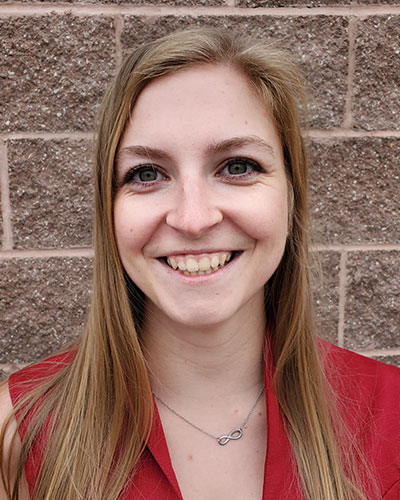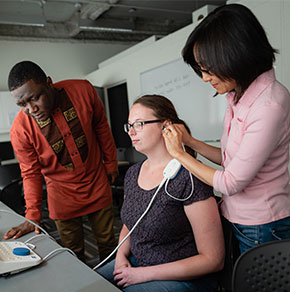Fall Graduation 2019
As a child, Angela Ryall was immersed in the deaf community through family members with hearing loss.
Audiology was a natural fit for her career so she pursued a degree in the faculty of medicine’s School of Audiology and Speech Sciences.
Now as a new graduate, Angela shares her research on how clients with hearing aids experience real-ear measurements and what the future holds for her.

Angela Ryall is a graduate of the faculty of medicine’s School of Audiology and Speech Sciences.
How did you become interested in studying audiology?
My parents are both deaf, so I have been exposed to some parts of audiology for a long time. My uncle, who is also deaf, told me about the field of audiology and when I did some research, I decided that I would pursue it. One of the main reasons I decided to pursue audiology was to be able to bring my and my family’s experience as an example to families who are being told their child has a hearing loss. As well, I would like to be a friendly face for the deaf community for those who are pursuing amplification as I know American Sign Language and have been brought up in the deaf community through my parents.
What was the focus of your thesis?
My thesis focused on a procedure called real-ear measurements that is completed when fitting clients with their new hearing aids. It was a qualitative project that used focus groups to gather the perspectives of first-time hearing aid users on a new type of counselling during real-ear measurements. We presented a demonstration of real-ear measurements that incorporated this new counselling, called informational counselling, and asked participants to comment on the demonstration. They commented on both the verbal and visual information that was presented to them.
What did you find?
We found that participants had a lot to say in terms of how to make informational counselling better. They provided information on what is currently being done well in terms of informational counselling, areas that need improvement, and gave specific ideas of change that could be made. From the data, recommendations were created for clinical audiologists, real-ear measurement system manufacturers, and the field of audiology.
Fall Graduation 2019
This fall, students graduate from a range of Faculty of Medicine programs.
What advice would you give to students considering studying at the school of audiology and speech sciences?
Three pieces of advice that I have for future students are: manage your time wisely, be open, and have fun. The program is very busy for both audiology and speech-language pathology students, but that being said, you will learn a lot of valuable information and feel pride for joining this field. With all the information that is being thrown at you I would say to be open to all the information as well as your peers and their input. Everyone is coming from various backgrounds and you learn so much from your peers. Finally, have fun! The program goes by so quickly so make sure you have a good support system and enjoy everything about the program, from the lectures, labs, group projects to the placements
What does a healthy community look like to you?
I believe a healthy community is one where resources are accessible, and professionals communicate and work together. I feel that some people have limited access to health resources and information about various health conditions, and providing more accessible information to clients would allow them to be more active in their health care journey. When speaking about professionals working together, there are some team approaches, but professionals should continuously work hard to keep each other in the loop. With these concepts I find the community is well supported and can continue to be healthy.
What’s next for you?
I recently presented my thesis at the Canadian Academy of Audiology conference in Halifax and have started working in an audiology clinic. Next steps are to publish my thesis in a peer-reviewed audiology journal and continue to immerse myself in audiology with my new employment.

